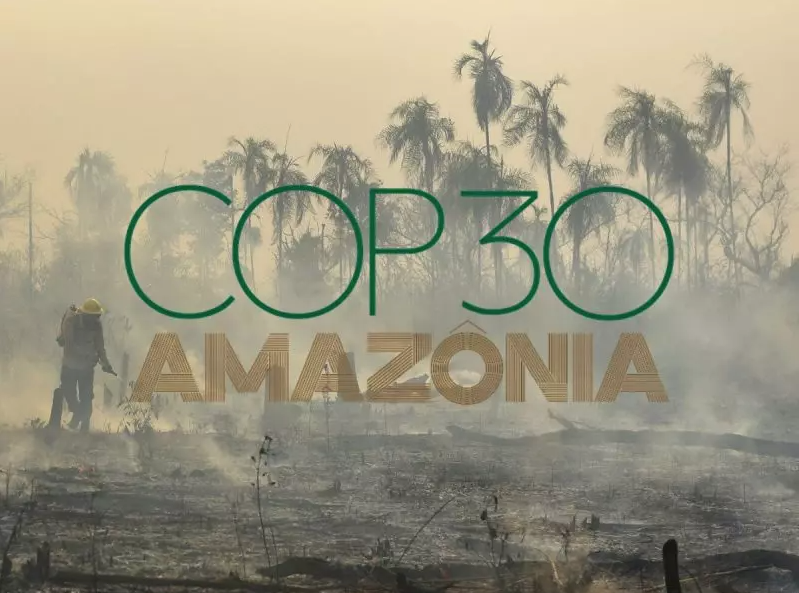The Future of the Planet is at Stake: Why COPs Matter to You
- Elétrica Sustentável Automatizada

- May 8, 2025
- 5 min read
The title may sound alarming, but it reflects an urgent truth: the future of our planet depends on the actions we take today. And at the heart of these actions are the Conference of the Parties (COPs). But what exactly are these meetings, and why should they matter to you, even if you’re not an environmental expert? Let’s unravel the history behind these crucial gatherings.

The Genesis of Concern: Sustainable and Ecological Development To understand the importance of COPs, we need to go back in time and understand the evolution of two fundamental concepts: sustainable development and ecological development. Although often used interchangeably, they have important nuances.
Sustainable Development: The idea of sustainable development gained momentum in the 1980s, culminating in the famous Brundtland Report of 1987, entitled "Our Common Future". The classic definition established there is: "development that meets the needs of the present without compromising the ability of future generations to meet their own needs". The main focus here is to balance economic growth, social justice and environmental protection. It is a development that considers the economic, social and environmental dimensions in an integrated way.
Ecological Development (or Ecodevelopment): This concept emerged a little earlier, in the 1970s, with a greater emphasis on the ecological limits of the planet. Ecological development places nature and ecosystems at the center, seeking development that is in harmony with natural processes and that respects the carrying capacity of the planet. It is more concerned with the preservation of biodiversity, the use of clean technologies and the minimization of environmental impact.
The Crucial Distinction: While sustainable development seeks to balance different pillars, ecological development prioritizes the health of the planet as the foundation for any form of development. We can say that ecological development is a narrower, more ecology-focused strand within the broader umbrella of sustainable development.
The Birth of COPs: A Global Response to Environmental Challenges
Growing awareness of global environmental issues, such as the hole in the ozone layer and the increasing greenhouse effect, has led to the need for coordinated action at the international level. A key milestone in this process was the United Nations Conference on Environment and Development, held in Rio de Janeiro in 1992. Known as the Rio-92 or Earth Summit, this historic event brought together leaders from around the world and resulted in the creation of several important documents, including Agenda 21, a plan of action for sustainable development in the 21st century, and the United Nations Framework Convention on Climate Change (UNFCCC).
The UNFCCC was a crucial starting point. It recognized that the climate system was being affected by human activities and set a primary goal: to stabilize atmospheric greenhouse gas concentrations at a level that would prevent dangerous anthropogenic interference with the climate system.
To monitor and review the implementation of the UNFCCC, a supreme decision-making body was established: the Conference of the Parties (COP). The first COP was held in Berlin, Germany, in 1995. Since then, COPs have met annually in different cities around the world, bringing together representatives of almost all countries (the “Parties” to the Convention), as well as international organizations, civil society and the private sector.
The Agreements that Shaped the Future (and the Present):
Over the decades, several COPs have been the scene of intense negotiations and resulted in historic agreements aimed at combating climate change:
Kyoto Protocol (COP3, 1997): This was the first legally binding international agreement that set greenhouse gas emission reduction targets for industrialized countries. It operationalized the UNFCCC by committing developed countries to specific emission reduction targets. The Kyoto Protocol had two commitment periods, the first from 2008 to 2012 and the second from 2013 to 2020 (Doha Amendment).
Paris Agreement (COP21, 2015): Considered a milestone in the fight against climate change, the Paris Agreement established a long-term global goal: to keep the increase in global average temperature well below 2°C above pre-industrial levels and to strive to limit the increase to 1.5°C. Unlike the Kyoto Protocol, the Paris Agreement takes a more universal approach, with all countries submitting their own Nationally Determined Contributions (NDCs) to reduce emissions. It also addresses issues such as adaptation to the impacts of climate change and financing for developing countries.
Glasgow Climate Pact (COP26, 2021): Building on the Paris Agreement, the Glasgow Pact reinforced the goal of limiting global warming to 1.5°C and called on countries to revisit and strengthen their 2030 emissions reduction targets. It also emphasized the need to increase climate finance for developing countries and established a dialogue to finance activities to avoid, minimize and address loss and damage associated with the adverse impacts of climate change.
Sharm el-Sheikh Implementation Plan (COP27, 2022): One of the key outcomes of this COP was the establishment of a fund to assist developing countries particularly vulnerable to the adverse impacts of climate change, addressing the issue of “loss and damage”. There was also a focus on implementing previous pledges and commitments.
Other Crucial Issues Discussed at COPs:
In addition to emissions reduction agreements, COPs address a wide range of climate change-related issues, including:
Adaptation: How countries and communities can prepare for and adapt to the inevitable impacts of climate change, such as rising sea levels, extreme weather events and droughts.
Climate Finance: How to mobilize financial resources to support mitigation and adaptation actions, especially in developing countries.
Technology Transfer: How to facilitate the dissemination of clean and sustainable technologies to help countries reduce their emissions and adapt to climate change.
Transparency: How to ensure that countries are reporting their emissions and progress towards their targets in a transparent and verifiable way.
Loss and Damage: How to deal with the impacts of climate change that are already occurring and cannot be avoided through mitigation or adaptation.
Forests and Land Use: The crucial role of forests in absorbing carbon and the need to combat deforestation.
Agriculture and Food Security: How agriculture can adapt to climate change and how to ensure food security in an unstable climate scenario.
Energy: The transition to renewable energy sources and the phasing out of fossil fuels.
Why Are COPs Important to You?
Even if you are not a climate scientist or an international negotiator, the decisions made at COPs have a direct impact on your life and the future of the planet:
Public Policies: The goals and agreements established at COPs influence public policies at national and local levels, affecting everything from the energy matrix to incentives for electric vehicles and the regulation of industrial emissions.
Economy and Jobs: The transition to a low-carbon economy creates new business opportunities and jobs in sectors such as renewable energy, energy efficiency and green technologies.
Health: Climate change has significant impacts on human health, increasing the frequency of heat waves, the spread of vector-borne diseases and air pollution. The actions discussed at the COPs aim to mitigate these impacts.
Security: Climate change can lead to resource scarcity, mass migration and conflict, affecting global security.
Quality of Life: A healthy planet is essential for our quality of life and the well-being of future generations. COPs are a crucial forum to ensure a sustainable future for all.

COPs are more than just annual conferences. They represent an ongoing global effort to address one of the greatest challenges in our history: climate change. Understanding the history behind these meetings, the agreements that were reached and the issues that were debated is essential to understanding our role in this future at stake. Following the discussions and results of COPs is a way to stay informed and engaged in building a more sustainable and resilient planet for everyone. The future of the planet is a collective responsibility, and COPs are a crucial stage where this responsibility is negotiated and, hopefully, fulfilled.
Want to learn more about green development and sustainable development?
Visit our page on these topics - Sustainable Systems.
#COPs #Conference_of_the_Parties #sustainable_development #ecological_development #Brundtland_Report #Agenda_21 #Rio_92 #Earth_Summit #United_Nations_Framework_Convention_on_Climate_Change #UNFCCC #Kyoto_Protocol #Paris_Agreement #Glasgow_Climate_Pact #Sharm_el_Sheikh_Implementation_Plan #greenhouse_gas_emissions #climate_change #global_warming #climate_action #adaptation #climate_finance #technology_transfer #transparency #loss_and_damage_forests #land_use #agriculture #food_security #energy #renewable_energies #fossil_fuels #future_of_the_planet #global_challenges #public_policies #economy #jobs #health #security #quality_of_life #sustainability #resilience #NDCs #Nationally_Determined_Contributions #Greenhouse_Effect #biodiversity #clean_technologies #Sustainable_Automated_Electrical #E_S_A






Comments